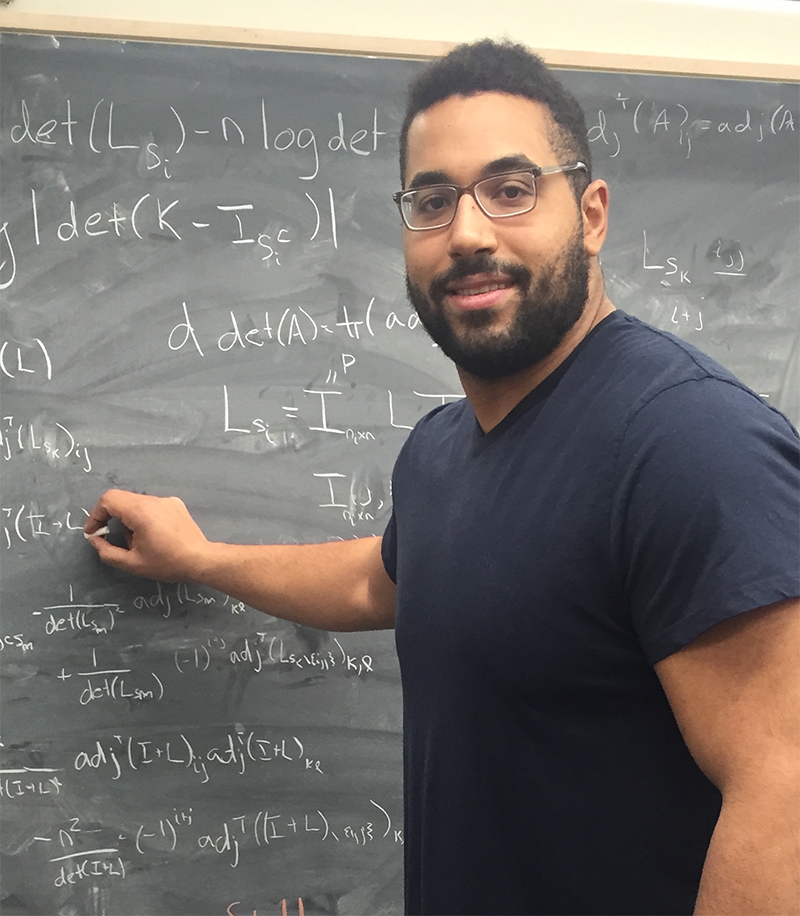John Urschel
Graduate Student, 2016-2021
Research: Combinatorial Optimization, Numerical Analysis, Spectral Graph Theory

Growing up, I didn’t want to be a mathematician. In fact, it never even occurred to me. In elementary school, my classroom had posters featuring all the careers that depended on math: engineering, IT, architecture, finance, and so on. Being a mathematician wasn’t one of them. I didn’t know what a mathematician did. I don’t think most people around me did, either.
What I did know was that math was supposed to be “useful” -- even the parts of it, like calculus, that obviously weren’t useful for most people. In high school, I was a very good math and science student, but I wasn’t very interested in being useful. I didn’t want to build bridges, or discover some distant planet. I didn’t really care about formulas that explained how things worked.
I cared about football. That was my focus, my passion. I went to Penn State to play football, not to get an education. But when I got there, something strange happened: I discovered mathematics, and I realized that, in some sense, I was well suited for mathematics all along.
When I got to Penn State, I started out as an engineering major (mostly to appease my mother). But I found engineering boring. I didn’t want to memorize formulas; I wanted to discover them. I didn’t want to know how things worked; I wanted to know why. I took a couple of math classes, and was fascinated. There was a freedom to it, a rigor and an elegance. During my sophomore year, I had a professor who called me into his office and gave me a book, Chaos: An Introduction to Dynamical Systems, a classic text, and suggested that I try a few exercises. From there, he introduced me to mathematical research, and suggested an open problem that became the basis for my first co-authored paper. I never had to work so hard -- nor never felt so rewarded. That’s when I knew that I wanted to be a mathematician.
I’ve been thinking a lot about how unusual my path was -- and not just because I spent years as a professional football player before ending up in graduate school at M.I.T. It turns out that the best training I got in math wasn’t in Algebra II but, doing hours and hours of puzzles by myself as a kid, hooked on the pleasure of coming up with new techniques and solving problems for myself. Football, too, turned out to be good training for math -- not because it taught me anything about leverage or statistics, but because it instilled a resilience that prepared me for frequent failures as I tried to tackle open problems. It also gave me social confidence, and a group of supportive friends. As both a football player and an African American student, early on I was somewhat of an outsider in math. I never attended a math camp and I’d never even heard of elite-level math competitions like the math olympiad or Putnam exam. If I had come to M.I.T. as an undergraduate, I probably would have seemed unprepared and might have felt lonely. I don’t even know if I would’ve stuck with math. But I never felt that way at Penn State, partly because my mother convinced me as a child that I should let nothing hold me back, partly because I had such a strong support system in my teammates, and partly because, at first, my identity wasn’t totally wrapped up in math.
It was only later that I realized how lucky I was. I listen to kids ask how I’ve managed to get to where I am, and talk about being behind or feeling like they can’t succeed because they don’t have the background that the “elite” students in their classes have. I didn’t have that background either. I’m lucky that I found a mentor in college who was willing to take the time to push and encourage me. I’m lucky that I had a mother and father and friends, first outside of math and then within it, who supported me. And I’m lucky that I have a competitive, contrarian streak, that helps drive me when I work alone. Not everyone is so lucky -- and I hope we can grow our community and our vision of what a path in mathematics should look like, so that not everyone needs to be.
